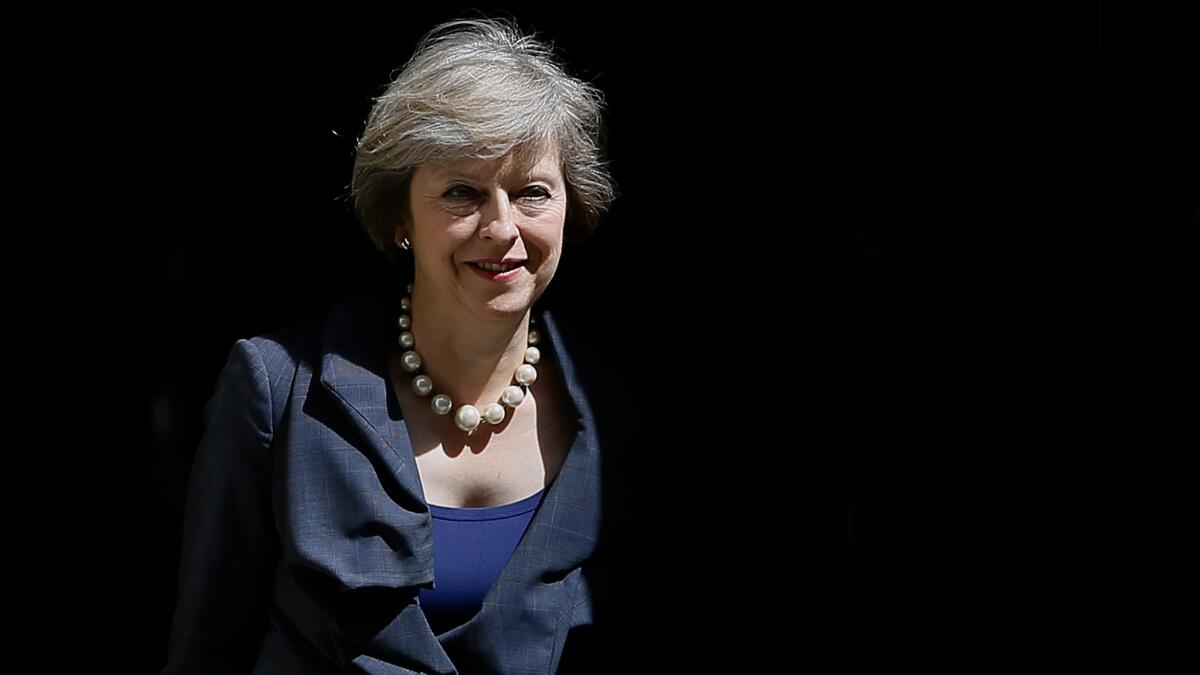Incoming British prime minister gets set to begin — oh, and the cat gets to stay

- Share via
As a big blue moving van rolled up to 10 Downing Street in London and outgoing British Prime Minister David Cameron made ready to hand off to his newly anointed successor Theresa May, Britons were fixated by questions momentous and mundane:
When would the new leader execute “Brexit”? And what would be the fate of Larry, the Downing Street cat?
May, a veteran Cabinet minister set to assume the prime minister’s post Wednesday, was swiftly put on notice that European leaders expected decisions, and soon, about the timing and nature of Britain’s disentanglement from the European Union after the country’s June 23 vote to leave the 28-nation bloc.
In Berlin, German Chancellor Angela Merkel – another pragmatic, detail-oriented politician to whom May has already drawn widespread comparison – told reporters that providing “clarity” on the nature of Britain’s relationship with continental Europe should be the new prime minister’s chief task.
May, like Cameron, had supported the campaign to remain in the EU, but she was hardly an outspoken advocate of staying in, and has said her inner circle will include figures who supported leaving as well as those who favored remaining.
Despite May’s brisk pledge that “Brexit means Brexit,” the lack of a fixed timetable for invoking Article 50 of the Treaty of Lisbon -- the triggering mechanism for a negotiated split -- leaves plenty of room for uncertainty.
The tea-leaf-reading over timing was in full swing Tuesday as May, 59, was set to become the new leader of the Conservative Party and the next prime minister.
Foreign Secretary Philip Hammond caused a stir when he told lawmakers that finalizing a divorce from Europe could take up to six years and potentially involve individual parliamentary ratification by all 27 other members of the bloc.
And May ally Chris Grayling, who handles government affairs in Parliament, also suggested that the process could be a lengthy one.
“We get ourselves ready for the negotiation; we decide what kind of relationship we want to negotiate, and then we move ahead and trigger Article 50,” he told Britain’s Sky News. “We’ll do it right, we’ll do it in a proper way, and we’ll do it when we’re ready.”
But even if a long goodbye to Europe is in the works, analysts said May would have little choice but to lay out her intentions and at least put the preliminaries in motion.
“My feeling now is it’s going to get started – everybody’s anxious for things to move on,” Philippe Le Corre, a visiting fellow at the Center on the United States and Europe at the Brookings Institution, said in an interview. “I have the impression that perhaps there’ll be some negotiations in the summer, but in September I wouldn’t be surprised if there’s an agenda put in place.”
May’s abrupt ascension – described by critics as a “coronation” since it did not involve balloting by the full party membership (she received the most votes in a ballot last week of governing Conservative Party lawmakers), let alone a popular vote – appeared to be having at least a temporary calming effect amid intense anxiety in financial circles over longer-term monetary repercussions of a split with the EU. The hard-hit British pound rallied slightly Tuesday from its post-referendum battering.
Meanwhile, the mechanics of the power handover ground steadily onward. Cameron presided over his final Cabinet meeting, with a gaggle of television cameras greeting May, who serves as Home secretary, as she approached her residence-to-be.
TV footage also documented the arrival of a large moving van, with a flurry of reports about the number of packing cartons to be deployed for the Camerons’ departure.
Unsurprisingly, animal-loving Britons were also obsessed with the feline angle on all this, and it soon emerged that Larry – a rescue shelter adoptee described by the Guardian newspaper as “a brown and white tabby entrusted with the rat-catching portfolio,” – would, unlike the outgoing prime minister, stay on at Downing Street.
More to Read
Sign up for Essential California
The most important California stories and recommendations in your inbox every morning.
You may occasionally receive promotional content from the Los Angeles Times.










